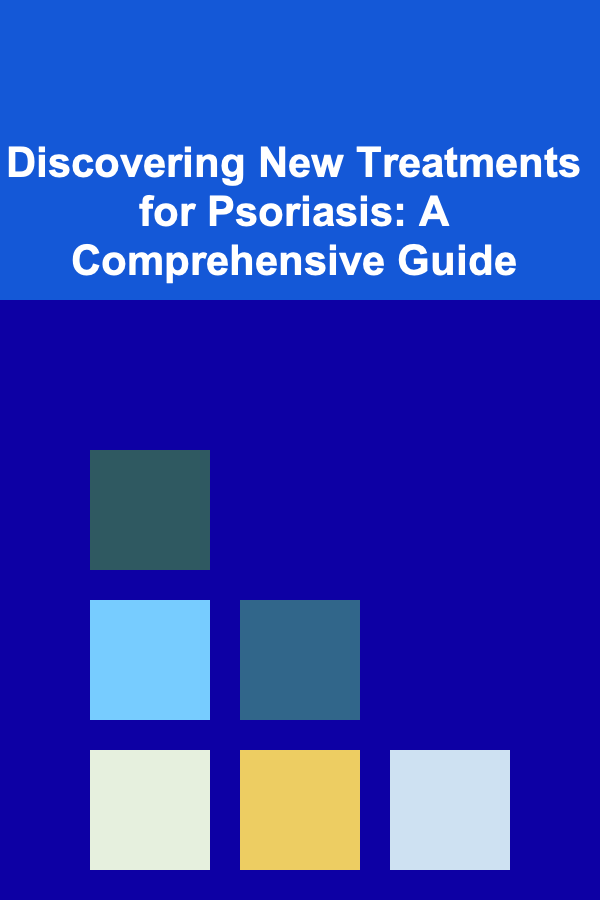
How to Research Genetic Screening for Newborns
ebook include PDF & Audio bundle (Micro Guide)
$12.99$7.99
Limited Time Offer! Order within the next:

Genetic screening for newborns is a crucial aspect of modern healthcare, offering early detection of various genetic disorders and conditions that may affect a child's health and development. The process allows parents and healthcare providers to identify conditions early, enabling early intervention, management, and better outcomes for the child. As medical advancements continue to evolve, understanding the complexities and implications of genetic screening has become an essential task for parents, healthcare professionals, and researchers alike.
In this article, we will delve into the steps involved in researching genetic screening for newborns, including the science behind genetic screening, its benefits, ethical considerations, challenges, and the importance of informed decision-making.
Understanding Genetic Screening for Newborns
Genetic screening is a medical test that involves analyzing an individual's DNA to identify any genetic conditions, mutations, or predispositions that could lead to specific health problems. When applied to newborns, genetic screening typically focuses on detecting genetic disorders that can be managed or treated early, thereby improving the child's quality of life.
Genetic screening can be done either through newborn screening (NBS) or expanded carrier screening (ECS), each with its specific purpose:
- Newborn Screening (NBS): This is a routine test performed shortly after birth. It screens for a set of conditions, including metabolic, hormonal, and genetic disorders, such as cystic fibrosis, sickle cell disease, and phenylketonuria (PKU). Newborn screening is mandatory in most countries to ensure that children receive timely treatment.
- Expanded Carrier Screening (ECS): This test is typically conducted during pregnancy or after the birth of a child. ECS identifies whether a person is a carrier for a wide range of genetic conditions, even if they do not exhibit any symptoms. It can help parents assess the risk of passing on genetic conditions to their children.
By identifying genetic disorders early, healthcare providers can initiate appropriate treatments, monitor the baby for potential complications, and counsel parents on managing the child's health.
Types of Genetic Conditions Detected Through Screening
There are numerous genetic conditions that can be detected through newborn genetic screening. Some of the most common conditions include:
Metabolic Disorders
Metabolic disorders result from genetic mutations that affect the body's ability to process and use certain substances. Examples of metabolic disorders detectable through newborn screening include:
- Phenylketonuria (PKU): A disorder in which the body cannot process an amino acid called phenylalanine, leading to brain damage if not treated.
- Maple Syrup Urine Disease (MSUD): A rare metabolic disorder that prevents the body from breaking down specific amino acids, leading to brain damage and other health issues if untreated.
Endocrine Disorders
Endocrine disorders occur when the body's hormones are imbalanced. A common disorder detected in newborn screening is:
- Congenital Hypothyroidism: A condition in which the thyroid gland does not produce enough thyroid hormones, leading to developmental delays and other health issues if not treated early.
Hemoglobin Disorders
Hemoglobinopathies are genetic disorders that affect the hemoglobin protein in red blood cells. The most common conditions include:
- Sickle Cell Disease: A genetic disorder where the red blood cells become misshapen, leading to pain, anemia, and potential organ damage.
- Thalassemia: A group of inherited blood disorders that affect hemoglobin production, leading to anemia and other health issues.
Cystic Fibrosis (CF)
Cystic fibrosis is a genetic disorder that causes severe damage to the lungs, digestive system, and other organs. Early detection can help manage symptoms and improve quality of life.
Genetic Syndromes
Some genetic syndromes are also detectable through newborn screening, such as:
- Down Syndrome: A chromosomal disorder that leads to intellectual disabilities and developmental delays.
- Tay-Sachs Disease: A rare genetic disorder that leads to the progressive destruction of nerve cells in the brain and spinal cord.
Others
Newborn genetic screening may also detect conditions like:
- Severe Combined Immunodeficiency (SCID): A condition where the immune system is severely weakened, leading to frequent infections.
- Biotinidase Deficiency: A disorder that impairs the body's ability to recycle biotin, a vital nutrient.
The Science Behind Genetic Screening
Genetic screening works by analyzing the newborn's DNA for specific genetic markers or mutations associated with known diseases or conditions. These markers are sequences of DNA that are either normal or altered in a way that can indicate the presence of a genetic disorder.
DNA Testing Techniques
The most common testing techniques used in genetic screening for newborns include:
- Blood Spot Testing: This is the most widely used method in newborn screening, where a small blood sample is taken from the baby's heel and analyzed for genetic mutations.
- DNA Sequencing: This technique allows for the detailed examination of a newborn's genetic code to identify specific mutations or variations in genes associated with genetic disorders.
- Polymerase Chain Reaction (PCR): PCR is a technique used to amplify small amounts of DNA, making it easier to detect genetic mutations.
Screening Panels
Newborn genetic screening typically involves testing for a panel of conditions, which may vary by country, region, or state. These panels may include tests for conditions such as PKU, cystic fibrosis, sickle cell disease, and more. In some cases, genetic testing can be expanded to include additional conditions based on family history or parental consent.
Ethical Considerations in Genetic Screening
While genetic screening offers numerous benefits, it also raises ethical concerns that must be carefully considered. Some of these concerns include:
Informed Consent
Before undergoing genetic screening, parents must provide informed consent, understanding the potential risks, benefits, and limitations of the screening process. Parents should be made aware of:
- What conditions are being screened for
- The accuracy of the tests
- The potential emotional and psychological impact of the results
Privacy and Confidentiality
Genetic information is highly sensitive, and its storage and use must adhere to strict privacy and confidentiality standards. Parents must be assured that their child's genetic data will not be misused or shared without their consent.
Potential for Discrimination
There is a concern that genetic screening could lead to discrimination in areas such as insurance, employment, or social services. Governments and healthcare organizations need to implement laws and regulations that protect individuals from genetic discrimination.
Psychological Impact
Receiving a positive result for a genetic disorder can be emotionally distressing for parents. Genetic counselors play an important role in providing support and guidance, helping parents understand the implications of the results and exploring available options for treatment and management.
The Importance of Genetic Counseling
Genetic counseling is an essential aspect of genetic screening for newborns. Counselors are trained professionals who help parents understand genetic test results, provide emotional support, and assist in making informed decisions about the child's care.
Role of Genetic Counselors
Genetic counselors offer a range of services, including:
- Explaining the purpose and process of genetic screening
- Interpreting the results of genetic tests
- Providing information about available treatments and interventions
- Discussing the likelihood of the condition being inherited and the chances of recurrence in future pregnancies
Counseling for Positive Results
If a genetic disorder is detected, genetic counselors help parents navigate the next steps, which may include further testing, treatments, and ongoing medical management.
Challenges in Genetic Screening
Despite the advantages of genetic screening for newborns, several challenges need to be addressed:
Limited Scope of Testing
Although newborn screening can detect many genetic disorders, it is not exhaustive. Not all genetic conditions are included in standard screening panels, meaning that some rare or less common disorders may go undetected.
False Positives and Negatives
Genetic screening tests are not always 100% accurate. False positives (when a test incorrectly indicates a condition) or false negatives (when a condition is not detected) can occur. This highlights the need for confirmatory testing and counseling.
Cost and Accessibility
While newborn screening is mandated in many countries, access to expanded genetic screening can be limited by cost, healthcare infrastructure, and regional availability. Efforts should be made to increase the accessibility of genetic screening for all families, regardless of socioeconomic status.
Future Directions in Genetic Screening for Newborns
As genetic research advances, the future of newborn genetic screening holds promise for even more comprehensive and precise testing. Some areas of development include:
Whole Genome Sequencing (WGS)
Whole genome sequencing is an emerging technology that has the potential to offer a more detailed analysis of an individual's entire genome. This could enable the detection of a wider range of genetic disorders, including those that are not currently included in standard screening panels.
Expanding the Scope of Screening
With advances in genomic technology, it is likely that newborn screening panels will continue to expand to include more conditions, particularly rare genetic diseases that are treatable if detected early.
Personalized Medicine
Personalized medicine, which tailors treatment based on an individual's genetic makeup, could revolutionize the management of genetic disorders in newborns. As our understanding of genetics improves, treatments and interventions can become more targeted and effective.
Conclusion
Researching genetic screening for newborns is an important step in understanding how these screenings work, the conditions they detect, and the ethical considerations involved. As medical technologies continue to evolve, the potential for early detection and intervention in genetic disorders increases, leading to better outcomes for children and families.
While there are challenges to overcome, including limited screening panels and ethical concerns, the future of genetic screening is promising. With careful research, informed decision-making, and appropriate counseling, genetic screening can continue to play a vital role in the early detection and management of genetic disorders in newborns, helping to ensure healthier, more prosperous lives for future generations.

How to Add Holiday Decor to Your Home Office for the Season
Read More
How To Explore Dwarf Planets and the Kuiper Belt
Read More
How to Make Smart Choices When Renting vs. Buying
Read More
How to Use Under-Bed Storage for a Clutter-Free Bedroom
Read More
What Tips Can Help You Maintain an Organized Closet?
Read More
Discovering New Treatments for Psoriasis: A Comprehensive Guide
Read MoreOther Products

How to Add Holiday Decor to Your Home Office for the Season
Read More
How To Explore Dwarf Planets and the Kuiper Belt
Read More
How to Make Smart Choices When Renting vs. Buying
Read More
How to Use Under-Bed Storage for a Clutter-Free Bedroom
Read More
What Tips Can Help You Maintain an Organized Closet?
Read More